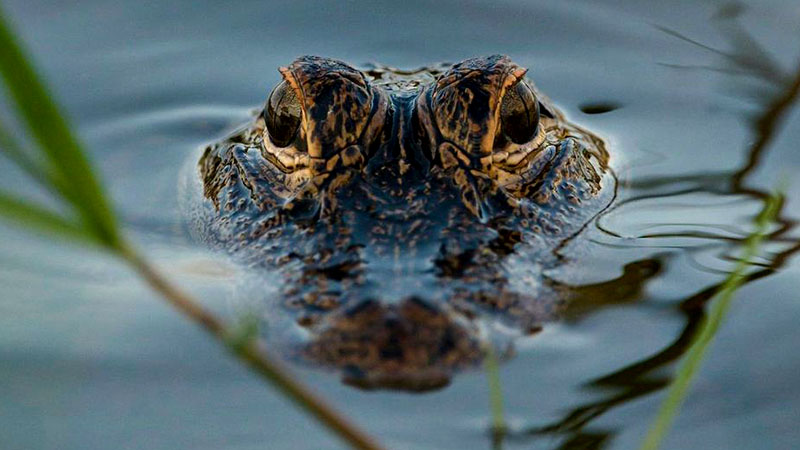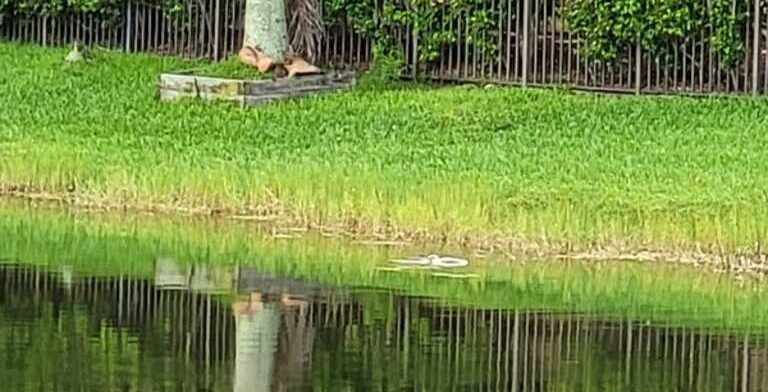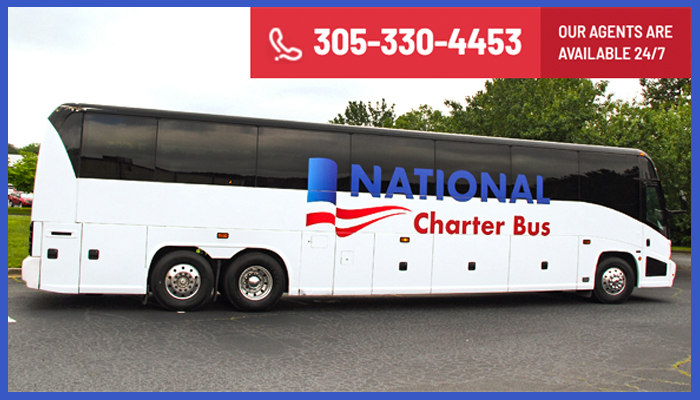
Alligator in Parkland. {Adam Baron}
By Agrippina Fadel
After an alligator killed a small dog inside the Heron Bay community on Saturday, it sparked a debate between residents on whether the predator needs to be removed.
Heron Bay resident George Casey posted about the August 19 incident on Nextdoor.
“I saw an alligator dragging a dog in the canal, drowning it, and then I watched it eat it,” he shared, adding that he was sorry for the loss of someone’s pet.
It is unclear how the dog ended up close enough to the water for the gator to attack and who it belonged to.
The post received over 200 comments from concerned neighbors. Some called for the removal or killing of the alligator, while others pleaded to coexist with Florida wildlife.
Judi C. from Boca Raton said, “So sad, I wish all those gators could be destroyed,” while Mari C. from Parkland added, “It is sad and horrible, but [what] do people think happens with the majority of pets that go missing here? Coyote or gator attack.”

Lake in Heron Bay community seconds after the alligator attacked the dog {Photo by George Casey}
While some residents believed the alligator could be relocated or “returned to the Everglades,” others explained that gators cannot be moved to a different area and must be killed if they pose a threat.
“We are the nuisance, not [gators]. We are in their habitat,” said Sam Walls-Dorio, adding that all the new housing developments are pushing the wild animals into the communities.
Lauren Claerbout, the Florida Fish and Wildlife Conservation Commission spokesperson, told Parkland Talk that relocating nuisance alligators is not a responsible option.
“Relocated alligators nearly always try to return to their capture site. In the process of returning, they can create problems for people or other alligators along the way. If an alligator successfully returns, capturing it again would be necessary and usually more difficult the second time,” she explained.
Claerbout said the Statewide Nuisance Alligator Program addresses alligator threats in developed areas and helps conserve them in natural habitats.
The program uses contracted alligator trappers throughout the state to remove gators believed to pose a threat to people, pets, or property.
Claerbout said captured alligators over four feet long become the trappers’ property and, in most cases, are processed for their hide and meat, which is the primary source of compensation for trappers’ services.
Occasionally, a nuisance alligator is sold alive to an alligator farm, animal exhibit, or zoo.
She added that FWC recommends always keeping a safe distance from alligators, keeping pets on a leash and away from the water’s edge, swimming only in designated areas and during daytime, and never feeding alligators.
People concerned about an alligator can call FWC’s toll-free Nuisance Alligator Hotline at 866-FWC-GATOR (866-392-4286).
Send your news to Parkland’s #1 Award-Winning News Source, Parkland Talk. Don’t miss reading Tamarac Talk, Coral Springs Talk, Coconut Creek Talk, and Margate Talk.
Author Profile

Related
 NewsOctober 17, 2024Parkland Chamber Launches Women’s Networking Collaborative
NewsOctober 17, 2024Parkland Chamber Launches Women’s Networking Collaborative NewsOctober 13, 2024GlamBar Salon Rebrands as Alchemy Park, Expands into Franchising
NewsOctober 13, 2024GlamBar Salon Rebrands as Alchemy Park, Expands into Franchising NewsSeptember 25, 2024Tickets On Sale: Not My Daughter Cancer Awareness Event Returns for 15th Year
NewsSeptember 25, 2024Tickets On Sale: Not My Daughter Cancer Awareness Event Returns for 15th Year NewsAugust 27, 2024Tickets On Sale: Not My Daughter Cancer Awareness Event Returns for 15th Year
NewsAugust 27, 2024Tickets On Sale: Not My Daughter Cancer Awareness Event Returns for 15th Year










































